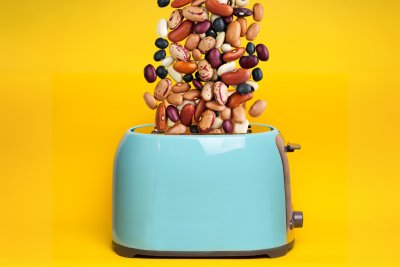Legume leg-up for white loaves?
Real Bread Campaign coordinator Chris Young ponders whether recent reports of beans in toast should set pulses racing.

Researchers from Aberystwyth University are working with Shipton Mill on a project to develop ‘healthier white bread’ by adding bean, pea or oat flour.
Our initial reaction is that we’ll be interested to see if this offers a natural way to raise fibre and micronutritional levels of white industrial dough products (or of white bread) to any meaningful extent. If so, this could be of some benefit to people who refuse to eat anything but white.
If pulses are to be added to loaves, buns, wraps, bagels and other baked goods, we want them to be non-GM ones, grown in the UK and preferably certified organic.
We’d also use it as a new opportunity to urge the government to reconsider our long-standing proposal for replacing mandatory ‘fortification’ of non-wholemeal wheat flour. We want to see a system that exempts a miller from adding minerals and synthetic vitamins to a flour (or, in the case, mixture of flours) if it naturally meets, or exceeds, set micronutritional standards.
Concerns
Thinking back to our findings around ‘wholegrain’ marketing, however, we are wary of how industrial dough fabricators might promote the addition of other flours.
At a fundamental level, an ultra-processed white Chorleywood Process loaf with a bit of powdered bean will still be an ultra-processed white Chorleywood Process loaf. The main ingredient will still be highly-refined, commodity wheat flour, laced with a handful of ‘token nutrients’ in an attempt to make up for what was inadvertently lost through plant breeding and/or purposefully stripped away by roller milling. It will still be manufactured through a ‘no-time’ process, with minimal fermentation, using a convoluted cocktail of synthetic emulsifiers and other additives, palm oil and so on. As such, it will still be surrounded by the same sort of questions and concerns that hang over ultra-processed food.
I asked Campaign (and Scotland the Bread) co-founder Andrew Whitley for his thoughts, he said:
‘This research is straight out of the discredited “health-by-stealth” playbook. It purports to offer “healthier choices” while obscuring the causes of ill-health associated with industrial dough products.’
Marketing
We foresee manufacturers and supermarkets invoking a ‘health halo’ in adverts, front-of-pack claims and other marketing. If they do, might this misdirect shoppers from thinking about, or looking for, other less desirable facts about products? Will it tempt people away from wholemeal, brown and other ‘wholegrain’ loaves, and even convince shoppers to pay a premium for ‘white plus’ - or whatever the call it?
Andrew’s thoughts? ‘If the only motive for buying this sort of product is heavy marketing by the system that caused the problem in the first place, you have to wonder what the confused loaf-eater is supposed to make of it. We need research that empowers people to address the real causes of personal and planetary ill-health.’
View from the mill
I also asked Shipton Mill’s owner, John Lister, about the project. He said:
‘In principle our research covers looking at which fractions of the wheat grain should be included to maximise the retention of the most nutritional elements, including the natural micronutrients that exist in grains as well as protein and carbohydrates.’
In addition we are looking at the nutritional profile of other grains and cereals. We have just started the research project and I guess it will be 12 months before we have a better idea.’
We’ll be keeping an eye out for results of the research, as well as any subsequent product launches…
Published Wednesday 22 May 2024
Real Bread Campaign: Finding and sharing ways to make bread better for us, our communities and planet.







